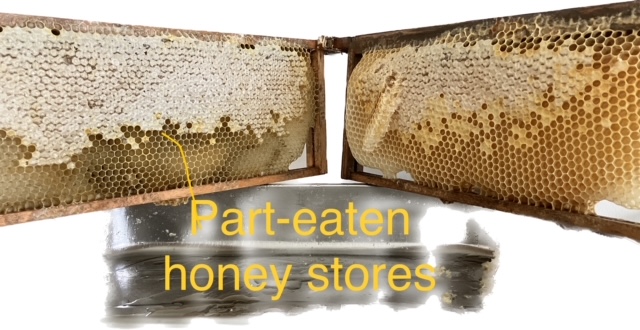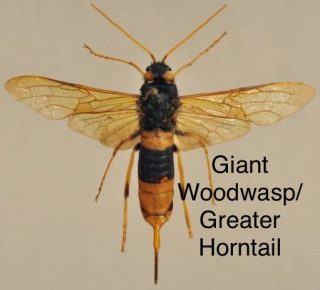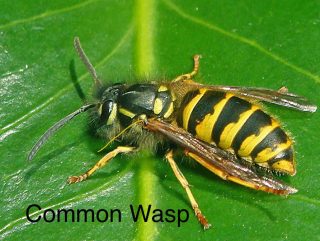We might be grumbling about the weather but spare a thought for our honey bees. The bad weather has left many colonies on the brink of starvation. Bee keeper Colin Rees brings us up to date on how his bees have fared this summer. And as a past President of the Cornwall Beekeepers Association he explains why there’s another Asian Hornet Week coming up in September.
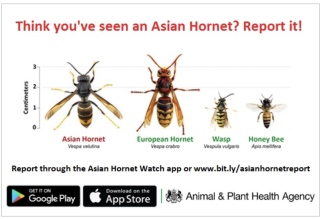
What a miserable couple of months July and August have been! High winds, rain, cold – typical British Summer weather you might say, but it’s had the bees in disarray. They spent all of June bringing in nectar and converting it to honey but since then there’s been little opportunity to gather anything much at all. Colonies throughout the UK are starving or on the brink of starvation. Whilst I have taken off the surplus honey from those colonies strong enough to withstand the loss, I luckily left several colonies with the supers of honey that they had made.
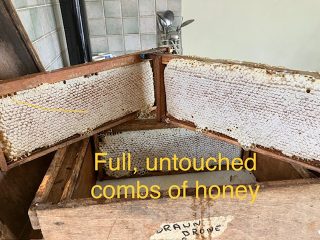
When I removed a couple of these a week or so back when we had some sunny weather, it was obvious how desperate they had been. The combs of honey were barely half full, the bottom rows of cells having been emptied to provide the life-saving sustenance they needed.
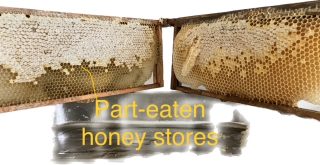
We generally have what is known as “the June gap” in the UK, when the Spring flowers have finished their blooming and the Summer flowers have yet to appear, meaning there is nothing (or at the best, very little) for the bees to forage on. It’s a time when all beekeepers need to keep an eye on the bees’ supplies to ensure they have enough food to keep them going until there is some nectar to retrieve. This year has seen a “Summer” gap!
So, with one poly nuc blown over at home and a full colony blown over at one of my out-apiaries, the earlier swarming frenzy that left a lot of colonies without enough food to see them through until the next fine weather and the swarms themselves in an equally difficult situation when they needed to build new comb for their new nest, it hasn’t been easy being a bee this season!! Luckily, the poly nuc had a perspex crown-board which the bees had stuck in place with propolis (the sticky exudation from plants such as laurel that bees use to seal gaps in their hive structure), so the combs were all held in place and no harm came to the bees. Likewise, the full colony was tipped over but remained intact. Though I checked the out-apiary after the high winds, everything appeared to be fine, but subsequent checking showed the hive had gone over and been put back in place by someone at the site. The lifts not having been replaced properly was the give-away! However, the bees were flying when I visited and all seemed to be in order. Time will tell.
I am currently trying to down-size my bee-keeping operation, selling colonies and nucs to those who are starting out and, in many cases, to established bee-keepers who are wanting to replace lost colonies or nucs. I couldn’t have chosen a better time, bearing in mind the nature of things this year, but overall it has not been what you might call an ideal beekeeping season, especially for those in their first year of beekeeping.
So, that’s most of the gloom and doom out of the way (I’ve got some more for you later on!). The good news is that I still have several strong colonies who have withstood the vagaries of the season, possibly due to their Cornish black bee heritage. These are patiently waiting for the ivy to start flowering (it’s nearly ready!), so they can build up their winter stores. Once that flow is under way then I can start thinking about how to over-winter the colonies I have left, but with the mizzle currently prevailing nothing will be done for a week or two yet by the look of things.
So far in 2023 there have been 24 Asian Hornet nests found in the UK in 22 locations, mainly in London, Kent and East Sussex, though there have been sightings in Northumberland and nests destroyed in Devon (Plymouth) and Dorset (Portland). This is really getting quite scary and a bit too close to home for my liking. I have also been contacted by two members of the public who were concerned that an insect they had found was an Asian Hornet. Fortunately, in both cases, I was able to re-assure them that the insect was NOT an Asian Hornet after they sent me photographs of what they had found.
Asian Hornets have also been spotted in the USA in Savannah, Georgia.
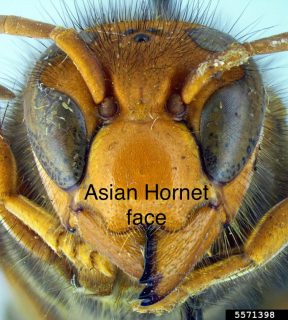
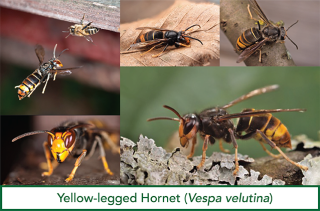
This has sent the US Department of Agriculture into a tail-spin as they are far behind the UK and parts of Europe such as France and Italy in terms of having a strategy for the containment of the insect. With climate change and global warming making more countries desirable to this pest we would be seeing the beginning of a big environmental problem if it succeeds in establishing a foot-hold in more countries outside Europe.
So, the British Beekeeping Association is holding another Asian Hornet Week from 4-10 September to raise awareness amongst the British public as well as beekeepers. This year it takes on a new urgency. There have already been multiple nest sightings, predominantly in Kent, but also in Hampshire and Devon. During Asian Hornet week there will be a series of talks on YouTube including an update from Nigel Semmence, NBU Contingency Planning and Science Officer. There will also be two live talks from Andrew Durham.
Why is Asian Hornet Week being held?
The aim is to raise awareness of the Asian hornet through a series of activities planned for the week. This hornet could decimate our pollinators including our honeybees so it is important to have everyone actively looking for it.
We are encouraging members of the public to download an updated version of the free ‘Asian Hornet Watch’ app on their phones. The app has been designed by the UK Centre for Ecology & Hydrology. Asian Hornets are often confused with similar species and the app has an expanded gallery of pictures to help with identification. Potential sightings can also be reported via the app. The app is available to download from the Google Play Store for android and from the App Store for iPhone.
Three easy steps to identify an Asian hornet
1. Does it look very black?
2. Has is got a wide orange stripe on the 4th segment of it’s abdomen?
3. Do it’s legs look as it they have been dipped in yellow paint?
The Animal & Plant Health Agency have put together a short film to help identify Asian hornets. There is also useful video on Youtube from Martyn Hocking at: https://www.youtube.com/watch?v=jOnb3R2ozz4&t=69s
Insect Look-a-Likes
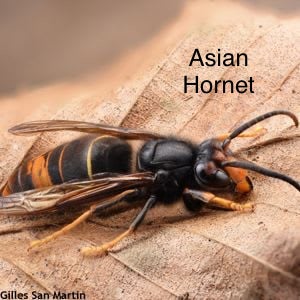
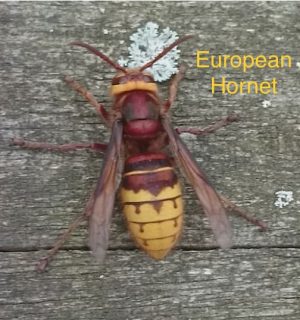
What to do if you spot an Asian hornet or a nest?
It is crucial you report any possible sightings so experts can take quick and effective action to eradicate Asian hornets. The best way is to use the ‘Asian Hornet Watch’ app to record and report any sightings. However, if you haven’t downloaded the app yet then send your photos and videos by email to: alertnonnative@ceh.ac.uk
See it! Snap it! Send it!
Colin Rees 07939 971104 colinbeeman@aol.com 01872 501313

